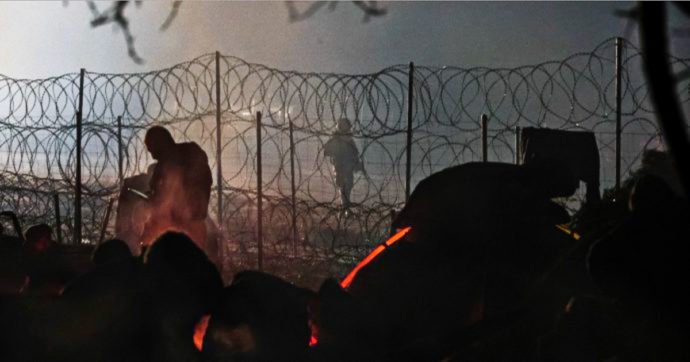The Ukrainian exodus to Europe has a front door called Poland. Since the Russian invasion on February 24, UNHCR data indicate that two and a half million people have crossed the Polish border. Four times as many have entered Romania, more than six times as many have repaired to Hungary. But the polish face of the European Union is not only the solidarity shown at the crossings where those leaving Ukraine land. Further north, other refugees from other wars cross the border in search of asylum, and the EU shows them another face. Where Poland borders Belarus, refugees from countries like Afghanistan and Syria face abuse and illegal refoulement. “The main problem is the lack of respect for the rules, and the climate of impunity in which the polish Border Guard operates,” explains Małgorzata Jaźwińska, a Warsaw-based lawyer who last week won in an appeal filed by three Afghans, who were arrested and then pushed back to Belarus despite having expressed the will to apply for asylum. Abuses that, according to the lawyer, concern thousands of cases in the last year alone. Concern about the health of the rule of law in the country has been expressed at various levels in Europe, but the EU has not yet arrived at a formal condemnation of the violations and abuses of migrants, more focused on sanctioning the violations of the belarusian government than on seeing what is happening within its borders.
To the east is Belarus, which through its diplomatic offices in Iraqi Kurdistan and Turkey grants visas and facilitates the arrival of migrants who are then pushed towards the EU’s external border. To the west is Poland, the extreme bastion of a European Union that has sanctioned the government of Belarusian Prime Minister Aljaksandr Lukašėnka for human rights violations, and that at the end of 2021 has further exacerbated the confrontation precisely because of the “instrumentalization” of migrants, used as “weapons” against the enemy Europe. Migrants who thus remain stuck in the woods, in a strip of land a few steps away from the border, camped in hunger and cold waiting to try again to enter, in the hope not to be rejected. Almost as if the Belarusian instrumentalization is also their fault, or as if it were enough to justify the suspension of international and european laws on the right to asylum, Poland has contracted thousands of illegal rejections to its border police. And despite rulings by the European Court of Human Rights, as well as other pending cases at the national and European level, the polish government continues to deny the existence of illegal practices and to defend the border guard.
Even in the case that closed on March 28 at the court in Bielsk Podlaski, fifty kilometers from the Belarusian border, a 2021 Internal Affairs Ordinance, which allows for the restriction or suspension of border traffic, should have been enough to cover the border police’s back. Under that regulation, border guards justify rejections across the border. In contrast, judge Joanna Panasiuk traced ministerial jurisdiction to border crossings only, and declared the arrest, detention, and refoulement of three Afghans on the night of August 29, 2021, “unjustified, unlawful, and inhumane”. “This is the first time a polish court has used the term ‘inhuman’ to condemn the actions of the border guard,” Małgorzata Jaźwińska, legal representative of the three Afghans in the appeal, tells ilfattoquotidiano.it. “In addition, the judge finally confirmed what part of civil society and many jurists have been arguing for a long time about the Internal Affairs order.” The political implications of the ruling are even more important in a Country where the very independence of the judiciary is in jeopardy after reforms implemented since 2015 that give the minister of Justice the power to second judges. According to the Court of Justice of the Union, the power given to the minister violates the Treaties and entails “the risk that it will be used as an instrument of political control of the content of judicial decisions.”
But the March 28 ruling goes further, describing in detail the suspension of the rule of law: “There is a lack of documentation and the applicants were not instructed on their rights, nor informed of the reason for detention. And the lawyer, who also presented himself with regular power of attorney at the border guard post in Narewka, for unknown reasons was not admitted.” Moreover, the judgement quotes a video in which foreigners expressly manifest to the border police the will to apply for international protection. Will protected by law and instead ignored by the agents. Finally, the judge denies the defense of the border guards, when they claim that the detention served “to feed and rest” the Afghans: “The purpose of the detention was to bring the foreigners to the Polish-Belarusian border at night – sheltered from possible observers, cameras and journalists. Aside from the fact that transporting a group of people in the middle of the night, deep into an inhospitable nature reserve and without proper clothing and equipment, was profoundly inhumane, what happened is also illegal.”
The reconstruction resembles that of many other incidents. “Thousands of rejected people we learned about between 2021 and 2022, most of whom fled Afghanistan, Syria and Iraq”, explains lawyer Jaźwińska, member of the Warsaw Association for Legal Intervention who also took the case of the three refugees to the European Court of Human Rights. However, the issue is not only about the work of a police force and the orders it receives. For anything to change, the findings of Jaźwińska and colleagues will have to come out of courtrooms. “But at the moment there is a strong climate of impunity, and polish authorities believe they can ignore the law, illegally detain and push people back. And border officials are not afraid because they know they are well protected“, explains the lawyer. She has no illusions about the consequences of the ruling: “If the rule of law were healthy, decisions like this would have consequences and would trigger other prosecutions. But this is not the case in Poland”. She tells that things have started to change since 2013: “Since then the reluctance of border agents to accept asylum requests has become a system, and without their cooperation there is no chance that things will change”.
And it is wrong to think that the officers belong to a feeling that is alien to the rest of the country. In January the reporter Dorota Borodaj managed to interview a border guard, one of the many reinforcements sent to the Belarusian border. He tells of how “younger colleagues believe what state television propaganda tells them: that the leftists must be driven out, that they are there to defend the borders from terrorists”. Then the rejections, amidst the inhospitable woods and marshy heath of the Białowieża Nature Park, one of the last primeval forests in Europe. In the interview published by the investigative newspaper Oko.press, the guard talks about the handcuffed people, the cell phones put out of order, the exhausted men, women and children loaded onto trucks and forcibly pushed across the border, through a hole in the wire nets that the agents call “package machine”. Including those who had epilepsy and women who needlessly displayed their pregnancies. “No one is believed. And those we push over the net beg us not to go back to Belarus. Sometimes they say they don’t want to go anywhere anymore, not Germany or Poland, they just want to go home“.
Last year, Warsaw’s decision to build a 186-kilometer wall along the Belarusian border made headlines around the world. Less noisy, however, was the parliamentary clash between majority and opposition over the appointment of the new Commissioner for Human Rights, a standoff that lasted months. The institution is disliked by the majority parties and openly opposed by the extreme right. Also because it is obliged by constitutional duty to monitor respect for freedoms and rights, including those of foreigners. Before handing over to successor Marcin Wiącek, professor Adam Bodnar delivered a report last July on the Interior Ministry’s proposals for reforming migration policies. “There is a lack of guaranteed access to the procedure of examining an application for international protection for people who declare such an intention at the border of the Republic of Poland,” he wrote, objecting to the idea “of entrusting the Commander-in-Chief of the Border Guard with the examination of appeals against decisions on expulsion. Entrusting the border guards with the judgement on human rights and freedoms poses a risk of conflict between public interests, border protection and prevention of irregular immigration on one hand, and the protection of human beings and respect for their rights on the other”. Warnings from an institution to which the government had already reduced the budget for the Commissioner’s oversight activity by 20 percent.
Refugees in Poland number no more than 1,500, and according to the Asylum Information Database (AIDA) accepted applications for international protection account for just 16 percent of those submitted. On appeal, then, those rejected are 99.5 percent (2020 Report). Yet, the fear of invasion works, and it is no coincidence that Poland, along with the other Visegrad countries, insisted that the temporary protection that the EU granted to refugees from the Ukrainian conflict be applied selectively, excluding most foreigners legally residing in Ukraine. Including those who cannot return to their country of origin and will have to deal with the national laws of Member States, starting from the Polish one, which for people waiting to regularize their presence “does not provide any benefits“, writes AIDA. A compromise, the one on temporary protection, that the Council of the European Union has accepted, unable to waive unanimity even when the legislation does not require it. It is the same European Union that, recalls Gianfranco Schiavone of the Association for Legal Studies on Immigration (ASGI), “has never condemned the violations of european law at the polish border”.
On the contrary, he writes in the monthly Altreconomia, “on December 14, 2021, the European Commission submitted to the EU Parliament a proposal for a new Regulation to “effectively manage the external borders of the EU” when “a third country instigates irregular migration flows to the Union by actively encouraging or facilitating the movement of third-country nationals to the external borders, and the nature of such actions may jeopardize essential functions of the State.”” On Friday April 8, just as president Ursula von der Leyen is visiting Poland, the EU Commission announced that it is cutting transfers of european funds to the Country by 69 million euros, as part of the sanctions imposed for failure to comply with a ruling of the Court of Justice of the EU that requires the abolition of the disciplinary section of the Polish Supreme Court, responsible for the dismissal of some judges critical of the government and never reinstated. The Union has repeatedly told the polish government that the NRRP funds also depend on respect for the rule of law. But the rule of law must reach even the most extreme borders, and the ukrainian conflict could contribute to putting the issue to one side, as many fear in the European Parliament as well.
Articolo Precedente
Profughi in Polonia, violazioni e abusi su chi fugge dalle altre guerre. In una sentenza (polacca) il volto “disumano” dell’Ue

Articolo Successivo
Al via l’edizione 2022 del Festival dei diritti umani: il tema è “La cura e il diritto alla salute”, con un’anteprima sulla guerra in Ucraina







